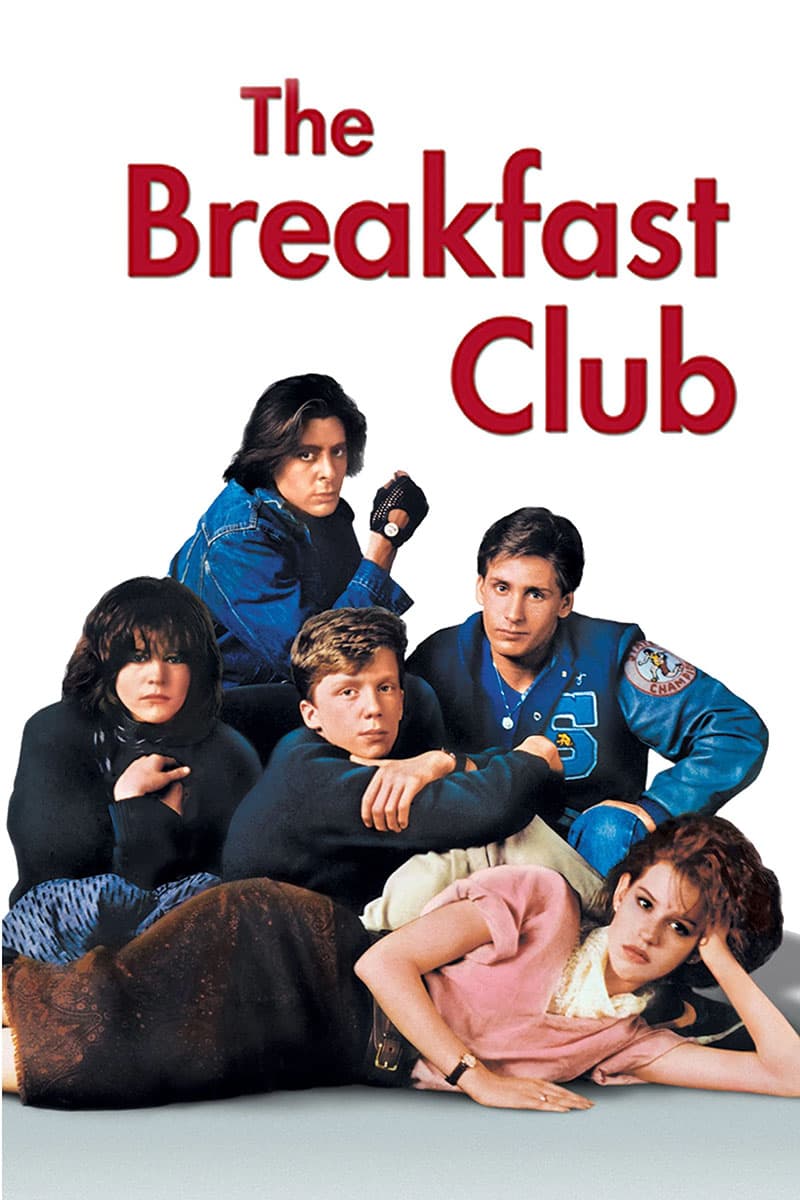The Breakfast Club (1985)

Five teenagers find themselves in an all-day Saturday detention. Rather conveniently for the film. each type of high school cliche is represented for this detention. There's Bender (Judd Nelson) - the no-hoper dopehead, Andrew (Emilio Estevez) - the jock, Claire (Molly Ringwald) - the popular princess, Brian (Anthony Michael Hall) - the nerd, and Allison (Ally Sheedy) - the misfit. They don't really know each other, and they spend a lot of the time arguing, joking, teasing and fighting with each other, all while deconstructing the lives, their motivations, the backgrounds, and finding themselves. It turns out that, despite their different outer layers, inside they're not all that dissimilar to each other. Yep, that's pretty much human beings in general. The Breakfast Club is meant to be one of those all-time 80s greats. Personally I found it ok, but not amazing.
Apparently, being a teenager means carrying along a load of angst and anger. Yes, teenage life is often about struggling with figuring out who you are, what you want from life, where you've come from, where you're going, while just battling through the day-to-day stuff too. But, it should also about still being young, free, hopeful. For these kids, teenage life just seems unnecessarily deep and serious. They spout phrases which are meant to sound meaningful, but that are actually mostly shallow and meaningless. They whine about their pressures, most of which originate from their parents. Bender's dad beats him, Andrew's dad pressures him to be a manly man (apparently he proves this by taping the buttocks of a classmate together - hence the reason for being in detention). Claire's parents are wealthy, and she just has to go along with whatever her friends say to remain popular and relevant. Brian is under pressure to perform well academically. His reason for being in detention is because he took a gun to school after flunking his ceramics class. They all have a chuckle when he tells them it was a flare gun. And his sad tears also turn to laughter tears. Allison is just ignored by her parents, but she likes being different anyway, and is only in detention because it gives her something to do. Of them all, only Bender seems to have a genuine reason for being angsty and angry with the world. But, it's hard to sympathise with him as he acts like a complete idiot through most of the film. He's clearly got no prospects in life, he looks like he's approaching 30 so I can only assume he's still had school because he's has to keep repeating eighth grade or something.
Supervising the kids is Richard Vernon (Paul Gleason), a teacher. He's been teaching for a while, and it's clear that time has made him bitter, cynical, and not much of a role-model. He's mostly painted as the villain in the movie, and of course, he has a lesson to learn too. He sets the kids the task to remain in silence for the duration, to stay seating, and to write a 1,000 word essay. Instead, the kids, shout and bicker throughout the afternoon, tear apart books, smash up parts of the library, smoke some pot, play some music and dance in a suspiciously choreographed fashion. Somehow, Emilio Estevez smashes a glass window just by screaming at it. All the while, Mr Vernon seems to wander around corridors for random reasons, spill coffee over his desk, and hide in the basement to look through confidential school records. He's then joined by the caretaker, and they too have a deep, but meaningless, chat.
Despite my criticism, the film was an entertaining watch. It flies by, and the young actors, who were core members of the so-called 1980s "Brat Pack", did a fantastic job of holding the film together. They do sometimes overact their parts in the film, but that kind of works for them all to over-emphasise their struggles. It's a comedy-drama, but is more drama than comedy. That said, it does sometimes feel like it jumps from one scene to another without flow. One minute they are arguing and moping, the next they're best buddies and bonding. It's still impressive though how each characters lives can be fleshed out quite extensively in just 90 or so minutes.
Inevitably, by the end of the film, the characters have all learned lots about each other. Which is good, and is to be expected. But, it's the way some of the interactions and events that take place during the day are resolved at its conclusion, that doesn't really work for me. And I'm not sure what its message actually is, and if anything has actually been learned, or was it just a case of Stockholm Syndrome.
For example, despite Bender treating Claire like crap for most of the film, they end up together by the end of it. Allison gets a makeover, going from her emo-misfit appearance to something more trendy for the 1980s. Andrew (Estevez) notices her, and they kiss. Because apparently, despite the film being about finding about what makes people tick on the inside, Andrew is only interested in Allison's outer appearance when it's attractive. And Brian, the nerd, he gets to write the essay for all of them.
And then we have one of the iconic 1980s film ending scenes. Bender on the sports pitch while "Don't You (Forget About Me)" by Simple Minds plays us out.